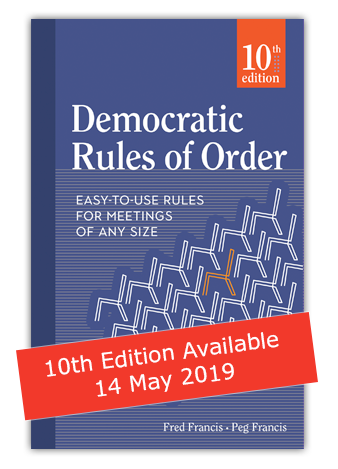Speaking in public can be an unsettling prospect for many people.
Stomachs begin churning and beads of sweat start rolling – even at events like weddings, where the prospective speaker will be surrounded by sympathetic family and friends.
So the prospect of actually chairing a board or even public meeting, keeping order during a heated debate, and ensuring that proper procedures are followed, can be positively terrifying.
The result is that very many skilled and committed people are unwilling to serve as the chair or in another officer role, even in quite small organizations.
Others, while remaining enthusiastic supporters of a society, are reluctant to speak up during debates in case they are somehow deemed to be ‘out of order.’
Such anxieties may be understandable, but to Joyce McMenamon, they represent something far more serious.
She sees them as a threat to democracy itself.
“People need to have confidence to share their views at meetings so that all opinions are heard,” she told the Echo.
“Chairs of meetings not only keep order and ensure procedures are followed, but they also have an important role in encouraging full participation in discussions and decision-making.”
McMenamon is doing something very practical to help more people get involved and give them the confidence they need.
The Merville resident runs Cool Heads Publishing, which has just launched a new edition of a little book with a big message – an easy to read and understand guide to running meetings of any size.
And she is offering to speak to organizations and societies to encourage greater democratic participation, including leading an upcoming Vancouver Island Strata Owners Association seminar on good governance.
The book doesn’t have the catchiest of titles – ‘Democratic Rules of Order’ – but the 72-page publication is proving particularly popular among non-profit societies, trades union locals and strata councils.
In part, that’s because many hundreds of pages of procedure set out in other respected guides like ‘Robert’s Rules’ have been replaced by just 27 pocket-size pages of essential information.
The remainder of the short publication is devoted to examples of how the rules work in practice, along with frequently-asked questions with answers so the procedures are easily grasped.
The original version of the book was drawn up by McMenamon’s parents, Peg and the late Fred Francis, 15 years ago.
“My parents were involved in all kinds of meetings – college meetings, community associations, business groups, local societies,” said McMenamon.
“After a particularly bad church meeting, dad had to lie down he was so stressed. He realized there must be a better way of running meetings.
“But when he sought advice on bookshelves and at the library, all the publications were heavy. He couldn’t find a short, simple guide for everyday use.
“So he said ‘let’s write our own’.
The resulting book provided a set of straightforward rules that, when adopted by any organization, became the official rules for the conduct of that group’s meetings.
And when there was any dispute about the way things were handled, the book could be used as the impartial ‘referee.’
The publication – which has since gone on to sell 15,000 copies – is based on two core principles.
First, it is the right of every member of an organization to be fully heard, participating in meetings following easily understood and accepted rules without intimidation, filibustering or other distractions.
Second, it is the right of the majority of members to make decisions so issues can be progressed, even when some members disagree with the outcome.
“We always need to remember we all belong to the same organization with a common purpose,” McMenamon explained.
“We can have widely differing views and still work together for a common good without dividing into opposing sides, each trying to get its own way.
“The best decisions are made when we listen thoughtfully to the information being presented and then make our own decisions privately.”
But what happens when the eventual decision goes the ‘wrong’ way? Must members who disagree with the outcome accept a legally taken decision?
“Yes, to practice democracy we must accept the decision and do what it requires us to do.
“But we don’t have to change our opinion. At some later date, the opportunity may occur for a review of the decision, or we may even find that the decision was good after all,” she suggested.
In a forward to the new edition of the book, former Ottawa parliamentary correspondent and CBC executive producer Douglas Leiterman suggests that Fred and Peg Francis did “an amazing job” in compiling the simplified rules that have proved to be “absolutely indispensable” to anyone chairing gatherings from condominium annual meetings to parliamentary assemblies.
He adds the couple had succeeded in “cutting through the forbidding complexities of running a meeting and reducing them to a simple set of common-sense rules that anyone can follow.”
For McMenamon, working with her mom to prepare and publish an updated 2009 version of the book, with new sections on topics like handling minority rights, has proved to be a stimulating project.
“Rules of order may be pretty boring,” she accepted, “but the exciting part is getting people fully involved in meetings, participating in decision-making.
“The process of making group decisions can be very frustrating and it’s often the reason that some skilled and energetic people avoid involvement.
“But people need to use democracy otherwise its benefits could be lost.”
Democratic Rules of Order (Eighth edition) is published by Cool Heads Publishing (www.coolheadspublishing.com) at $8.95 and is available locally from the Blue Heron bookstore in Comox and Laughing Oyster bookstore in Courtenay. It is also available online direct from the publisher or at www.amazon.com. It can also be consulted in Courtenay Library.




 August 28th, 2009
August 28th, 2009  dro_admin
dro_admin  Posted in
Posted in